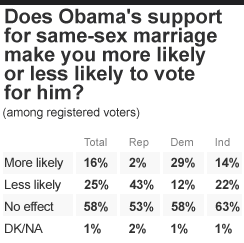Poll: One in four less likely to back Obama over same-sex marriage
CBS News Poll analysis by the CBS News Polling Unit: Sarah Dutton, Jennifer De Pinto, Fred Backus and Anthony Salvanto.
(CBS News) One in four registered voters say they are less likely to vote for President Obama in November because he expressed support same-sex marriage, according to a new CBS News/New York Times poll.
While 25 percent say the president's support for same-sex marriage makes them less likely to support his reelection, 16 percent say his position makes them more likely to support him. Fifty-eight percent say the announcement will not affect how they vote.
Republicans were most likely to say the announcement made them less likely to support the president, with 43 percent making that assertion. Even before he came out in support of same-sex marriage, Mr. Obama had little support from Republican voters. In the new survey, conducted from May 11-13, only five percent of Republicans said they would vote for the president in November.
More worrisome for the president is the percentage of Democrats and independents who say the decision will sway their views. And that figure, while smaller, is not insignificant.
Among Democrats, twelve percent say Mr. Obama's position makes them less likely to back him, while 29 percent say they are now more likely to do so. And 22 percent of independents say they are now less likely to vote for the president, while 14 percent say they are more likely to vote for him.
Twenty-three percent of registered voters, including 11 percent of Democrats and 20 percent of independents, say presumptive Republican presidential nominee Mitt Romney's opposition to same-sex marriage makes them more likely to vote for him. Seventeen percent say it makes them less likely to support him, a figure that includes 20 percent of independents but just two percent of Republicans.
The survey found that 38 percent of Americans overall believe same-sex couples should be allowed to marry. Twenty-four percent said such couples should have the right to civil unions, while 33 percent said same-sex couples should have no legal recognition.
Poll: Most Americans support same-sex unions
Asked if they had to decide if same-sex marriage should be legal, 51 percent said no, including 81 percent of Republicans, 25 percent of Democrats and 54 percent of independents. Forty-two percent said yes, including 13 percent of Republicans, 63 percent of Democrats and 43 percent of independents.
Fifty-percent of Americans (including 70 percent of Republicans) say they favor an amendment to the U.S. Constitution that would allow marriage only between a man and a woman, something presumptive Republican presidential nominee Mitt Romney supports. Forty-six percent, including the president, oppose such an amendment.
Though 50 percent of Americans said they favor a constitutional amendment banning same-sex marriage, 57 percent said laws regarding whether same-sex marriage is legal or not should be determined by individual states, including 63 percent of Republicans. Thirty-two percent - including 43 percent of Democrats - said it should be determined by the federal government.
Sixty-nine percent of respondents say they have a work colleague, close friend, or relative who is gay or lesbian. Fifty-nine percent say they have a gay or lesbian friend or family member who is married or in a committed same-sex relationship.
Most Americans believe that the president came out in support of same-sex marriage for political reasons. Sixty-seven percent overall said his decision was grounded in politics, including 86 percent of Republicans and 70 percent of independents. Only 24 percent overall said he made the decision because he thought it was the right thing to do.
Poll: Romney has slight edge over Obama
Read the complete poll (PDF)
This poll was conducted by telephone on May 11-13, 2012 among 615 adults nationwide, including 562 registered voters, who were first interviewed for a CBS News/New York Times Poll conducted April 13-17, 2012. Phone numbers were dialed from samples of both standard land-line and cell phones. The error due to sampling for results based on the entire sample could be plus or minus four percentage points. The margin of error for the sample of registered voters is four percentage points. The error for subgroups is higher. This poll release conforms to the Standards of Disclosure of the National Council on Public Polls.
